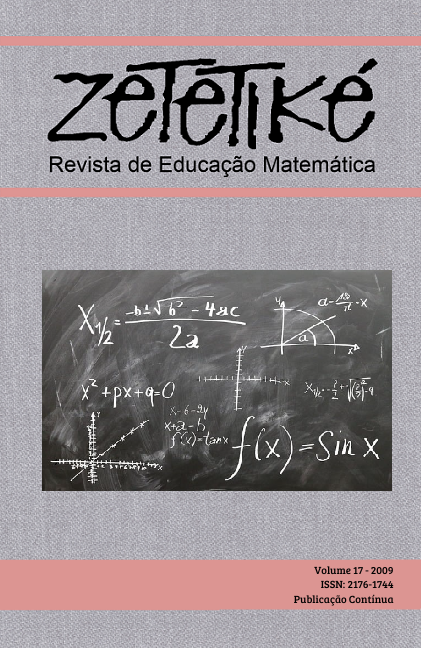Abstract
This article takes as a reference the research conducted with the goal
of analyzing the possibilities of forming a collaborative type of work group of
instructors of teachers, responsible for the discipline of Differential and Integral Calculus, in a Teaching Credentials Course in Mathematics. The guiding
questions of the investigation were: what are the possibilities and difficulties so
that a collective work group, consisting of instructors of teachers, can begin to
work in a collaborative way? In what way can experiences such as this one
improve the teaching activities in undergraduate courses, and in particular, in
Mathematics Teacher’s Credentials courses? In this article, we present
theoretical foundations of the research and data analysis, highlighting: personal
relationships between group members, participation rate, aspects related to
leadership and forms of relationship, problems faced by the group for lack of
knowledge about a certain subject and the attitudes taken together by the
group, and, finally, the evaluation of the participants.
References
BOAVIDA, A. M.; PONTE, J. P. Investigação colaborativa: potencialidades e problemas. Refletir e investigar sobre a prática profissional. Lisboa: APM, 2002. p. 43-55.
BRASIL. Diretrizes curriculares nacionais para formação de professores da educação básica, em nível superior, curso de licenciatura, de graduação plena. Brasília: Ministério da Educação, 2001.
DAY, C. Desenvolvimento profissional de professores: os desafios da aprendizagem permanente. Porto: Porto Editora, 2001.
FERREIRA, A. C. Um olhar retrospectivo sobre a pesquisa brasileira em formação de professores de matemática. In: FIORENTINI (Org.). Formação de professores de matemática: explorando caminhos com outros olhares. Campinas: Mercado de Letras, 2003. p. 19-50.
FIORENTINI, D. Em busca de novos caminhos e de outros olhares na formação de professores de matemática. In: FIORENTINI (Org.). Formação de professores de matemática: explorando caminhos com outros olhares. Campinas: Mercado de Letras, 2003. p. 7-16.
HARGREAVES, A. Changing teachers, changing times: teachers’ work and culture in Postmodern Age. New York: Teachers College Press, 1994.
HOPKINS, D. Towards a theory of school improvement. In: GRAY, J.; REYNOLDS, D.; FITZ-GIBBON, C. (Ed.). Merging traditions: the future of research on school effectiveness and school improvement. London: Cassel, 1996.
LOPES, C. A. E. Conhecimento profissional e grupo colaborativo: uma pesquisa com educadoras matemáticas na infância. In: SEMINÁRIO INTERNACIONAL DE PESQUISA EM EDUCAÇÃO MATEMÁTICA (SBEM), 2., 2003, São Paulo.
MORTIMORE, P; SAMMONS, P.; STOLL, L.; LEWIS, D.; ECOB, R. Key factors for effective junior schooling. In: POLLARD, A.; BOURNE, J. (Ed.). Teaching and learning in the Primary School. London: Routledge, 1994.
MCLAUGHLIN, M. W. What matters most in teachers’ workplace context? In: LITTLE, J. W.; MCLAUGHLIN, M. W. (Ed). Teachers’ work: individuals, colleagues and contexts. New York: Teachers College Press, 1993. p. 73-103.
PATTON, M. Q. How to use qualitative methods in evaluation. Newbury Park, CA: Sage, 1987.
PONTE J. P. Didácticas específicas e construção do conhecimento profissional. In: TAVARES, J.; PEREIRA, A.; PEDRO, A. P.; SÁ, H. A. (Ed.). Investigar e formar em educação. In: CONGRESSO DA SPCE, 4., 1998, Porto. Actas...... Porto: SPCE, 1998. p 59-72.
ROSENHOLTZ, S. Synthesis of research on the effects of class size. Education Leadership, p. 80-90, abr. 1989.
SANTOS, L. A Prática lectiva como actividade de resolução de problemas: um estudo com três professoras do ensino secundário. Tese (Doutorado) — Universidade de Lisboa, Lisboa, 2000.
SOUZA Jr., A. J. de. Trabalho coletivo na universidade: trajetória de um grupo no processo de ensinar e aprender cálculo diferencial e integral. Tese (Doutorado) — Unicamp, Campinas, 2000.

This work is licensed under a Creative Commons Attribution-NonCommercial-NoDerivatives 4.0 International License.
Copyright (c) 2014 Zetetiké: Revista de Educação Matemática

